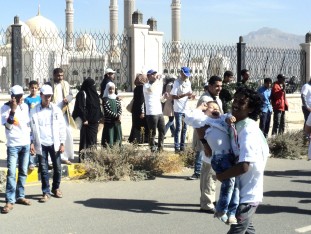By: Jihan Anwar
This past week, the Special Olympics gathered volunteers from different organizations, occupations and age levels to participate in a very unique marathon. Special Olympics Chairman Fares Al-Sanabani remarked, “We wanted to remember this day and it has been memorable - a celebration and sign of humanity.”
Wafa’a Al-Sagheer, Media Coordinating Officer for the Special Olympics, explained that the “Take My Hand, Thank You“ marathon was the first ever of its kind.
“Every time an event is organized for people with a handicap, we let them feel as if they were the ones necessitating our pity. However, this time it will be different: they will be the ones inspiring admiration, the ones winning and making their families proud.”
The marathon featured 150 competitors with special needs running with 150 of their family members. 1300 volunteers, 200 of whom were from the organizing committee, contributed to making the event happen.
The idea of the marathon received the support and interest of many people, in spite of the fact that most of the media focused on the 12/12/12 cleaning campaign, which was held on the same day. In particular, university students embraced and supported the idea. Famous personalities and embassies also decided to support and be present at the event. The British Ambassador and German Embassy Deputy Head of Mission awarded the winners, while every athlete was given a medal.
“Even if only one person supported the campaign, we would still consider it a success, because all we wanted was to let people with special needs know that we acknowledge their presence and they have all our respect,” declared Al-Sagheer.
Volunteers stood and waited along the running track’s sidelines. During the marathon, if any of the athletes were perceived to be being tired or having difficulties, it was the volunteer’s duty to join the marathon and help the special needs runner arrive at the finish line, even if it meant physically carrying him or her.
Al-Sagheer explained that the purpose of the marathon was to raise awareness about the presence of people with handicaps and to prove that this portion of society can be productive one, with goals for the future, ambitions and hopes.
“With the parents, we felt a bit of hesitation… In Yemen, handicapped people are forced to contend with taboos; it’s thought that they shouldn’t be taken outside. We want to break these limitations and automatically imposed restrictions. The fact that a person suffers from some kind of motion impediment doesn’t make them less human or capable. Who knows? Maybe they have a bigger future in front of them than society pictured,” added Al-Sagheer.
She said that some of the handicapped people she encountered were really creative and talented, but needed the opportunity to show what they are able to do.
“There is for example, a child, Abdullah, who has incredible flexibility. Ibraheem is blind, but has amazing agility and speed when running. There are many autistic girls I’ve met who can create amazing handmade crafts. We want the families to be proud of their children. Why should they hide them? This was a decree from Allah, and there’s nothing they need be ashamed of.”
Haitham Al-Saqqaf, a member of the Organizing Committee, stated that his reason to help out in the marathon was that he would have the opportunity to “put smiles on the faces of a fraction of society that is often forgotten.”
“There has been no one before that had stepped up and declared their support for people with special needs,” observed Al-Saqqaf.
The names of families participating in the marathon were registered and a placed in a database so that after the event, they would be presented with social awareness videos and fliers. “We will try to provide them with some type of healthcare, and maybe give them a chance to participate in international competitions,” said Al-Sagheer.
There are plans for doctors to give families presentations to help them understand the best ways to deal with their children.
“If their own relatives don’t know how to talk to and address them, imagine how able our current society is to do that,” said Al-Saqqaf.
Hashim Navarro shared his experience: “When I went to a Special Needs school, I realized that this was an experience that was bound to change me. Simply seeing how people with special needs loved life opened my eyes in many ways. I realized I was being ungrateful and taking what I had for granted. I learned about caring about people and giving back to the community.”
Navarro added, “They respect life in a way which is probably difficult for us to grasp…That’s why they deserve more than us. They deserve more attention, they deserve more love, they deserve more care and time.”
Special Olympics volunteer Khadeja Badr commented, “We had already volunteered with international organizations, but we were frustrated about the fact that there wasn’t any real impact on society; we put in so much effort and there was no tangible result. We would have an inauguration ceremony, a closing one, and some claps in the middle. But this event was very different for us.”
“The whole event has been organized by the youth; they did a great job, better than political parties or the government. I’m really impressed,” said Al-Sanabani. “We’re planning to hold the same event in Aden and other governorates. The idea is to integrate special needs people in their communities and bring smiles to their faces.”



great